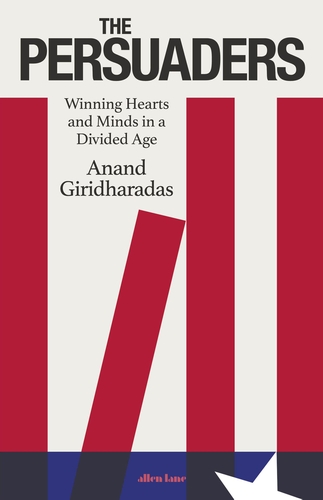Anand Giridharadas. The Persuaders. Winning Hearts and Minds in a Divided Age, Allen Lane 2022
Anand Giridharadas wrote a highly successful book in 2019 called Winners Take All. It dealt with the strategy of the world’s rich who set themselves up to serve equality and justice in order to counter threats to the social order that keeps them in the privileged position they have won. They do good, but not at the cost of doing no harm. Giridharadas wondered how it was possible to believe in a class of rich people running for office to solve problems that would be better left to public institutions. Institutions that those same rich people were constantly weakening through lobbying and tax avoidance. Giridharadas suggested that instead of waiting for the leftovers of the rich, societies would do better to reform themselves, through long and arduous democratic work, to arrive at better justice and less inequality.
How can one hope that democracies will be able to address crucial problems such as growing inequality and the climate emergency when society seems fragmented, positions polarized, opinions radically divided? In the United States, as in many countries of Europe, a paralyzing divisiveness seems to prevail over reasons for dialogue and building shared solutions.
If what an opponent claims is considered not because of what he says but because of the category to which he belongs, if it is considered that that social identity of his is the enemy and there is nothing that can change that fact, then the possibility of discussion is lost and one can only admit the irremediable, unchangeable distance. But if the differences are deemed unchangeable because of prejudices about the category to which each person belongs (white male, woman, young person, person of color, and so on) the possibility of discussing individual issues and arriving at new ideas to approach a compromise suitable for making a shared decision is lost.
According to Anand Giridharadas, a prevalence of prejudice prevents the functioning of the fundamental system by which shared decisions are reached: persuasion.
Fueling the misconception that everyone in society feels threatened by people because of the characteristics considered immutable in the categories to which those people belong weakens democracy. Prejudices that divide society into insanely adversarial categories is precisely what – according to the reconstructions reported by Giridharadas – the Russians in America (and in Europe in all likelihood) did with great foresight. The divisions were there. But the Russians worked to feed them, widen them, radicalize them, using social networks. A St. Petersburg-based company, the Internet Research Agengy (IRA) – Giridharadas reports – launched tens of millions of posts that got millions of likes and helped increase anger among parts of American society and disgust with institutions. And in all likelihood the IRA is not the only agency that has been active in this regard. Not least because making high-impact posts – emotional content not necessarely related to reality – could have been profitable.
Giridharadas is convinced that we can begin to believe again in the possibility of agreeing, changing minds just enough to find consensus and overcome the paralyzing division that prevails in this era in Western democracies. The book is worth reading to learn more about possible ways to achieve this.
Below Giridharadas discusses this in an interview for The Agenda with Steve Paikin.





Commenta